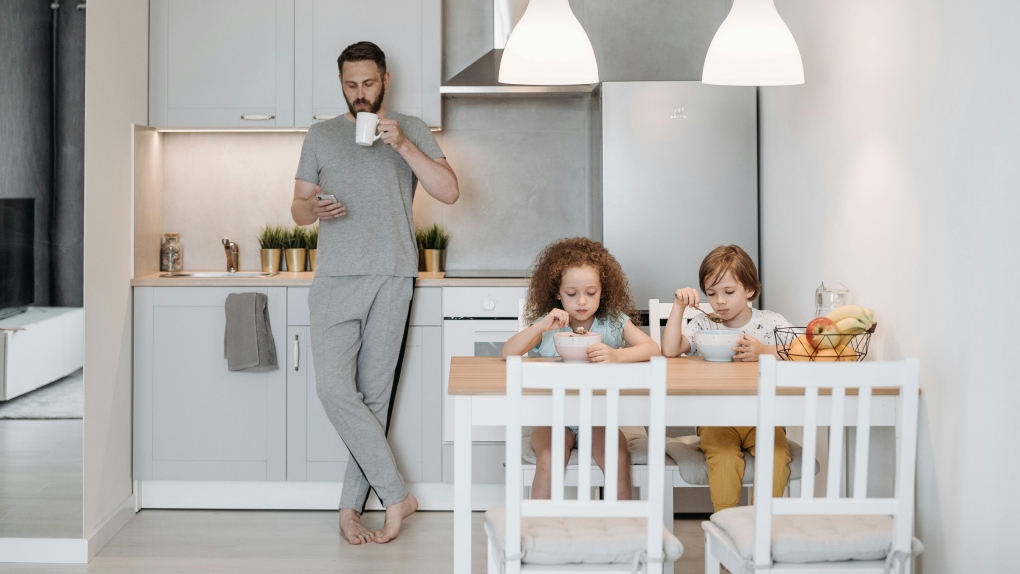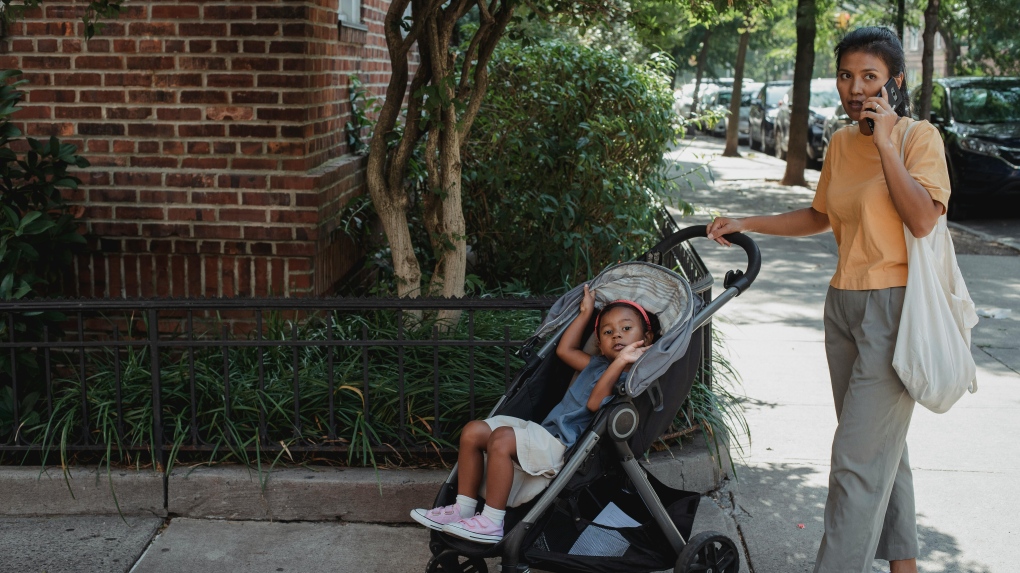This type of screen time has the worst effect on kids: experts
The research on children's screen time is pretty conclusive: less is more.
However, according to some experts, there is one type of screen time that is continuously excessive, and it's having a severe effect on our children: parents' screen time.
Experts say when it comes to a child’s development, parents should spend less time worrying about their kids’ screen time -- and focus more on reducing theirs.
"When you have a parent who is disengaged and not giving the children that attention, it does have a very negative impact on their development," explains Dr. Victoria Talwar, Canada research chair in the Department of Educational and Counseling Psychology at McGill University. "They need to be able to explore their world and learn about it and engage with their environment in a hands-on way."
She says parents have a strong hand in developing their children's early language, cognitive and emotional self-regulation capabilities.
"If we're distracted and not paying attention to them, they're not getting that conversational input with us, which is really important for their development of understanding the world," Talwar states.
Dr. William Bukowski, a professor of psychology at Concordia University, acknowledges that parenting is a tightrope-like balancing act.
"You don't want to be too invasive. You don't want to be intrusive," he notes. "No one wants to be the helicopter parent, at least I don't think anyone wants to be."
All the same, he points out that parents are a primary source of guidance and support, whether it be helping a child prepare for a test or teaching them to identify and manage their emotions.
"The idea that screen time might disrupt that is that the more time you spend doing one thing, the less time you spend doing something else," he explains. "Sometimes when you're dealing with screen time, you end up closing the screen, but still thinking about whatever it was that you just happened to see."
 A father on his phone as his children eat breakfast. (Pavel Danilyuk/pexels.com)
A father on his phone as his children eat breakfast. (Pavel Danilyuk/pexels.com)
Half-hearted attention
The biggest issue surrounding parents' screen time?
Tuned-out parents who are continuously giving their kids half-hearted attention as they doom-scroll TikTok or Instagram.
"Are you present in the relationship or are you not present in the relationship?" Bukowski asks. "Sometimes, your presence is needed more than it is at other times, and if at that moment, you're distracted by something, then it's a lost opportunity. It also might inform someone about how important am I to that person. Am I less important than the screen?"
He points out a parent's main role is to be in their child's zone of proximal development, a concept in educational psychology that represents the space between what a person is capable of doing alone and what they struggle to do even with support.
"I think that many moments in parenting are the golden moments when suddenly you see the need to be inside your child's zone of proximal development where they suddenly need 30 seconds of scaffolding that's going to help them get past something," Bukowski tells CTV News. "The more you're distracted by some other things, which is the way things are sometimes, the less time you have to be attentive to that moment when you're needed."
Talwar adds that researchers have found that parents can spend up to 30 per cent of their time looking at their phones while at the playground with their kids.
"During that time, there's a much higher likelihood of children doing things like tumbling off the slides or falling off swings," she said. "It also means that we're not paying attention or engaging with our children, and a key way that children learn is through engaging with their environment, including us, and that's important for them."
 A mother on her phone as she takes a walk with her child. (Kamaji Ogino/pexels.com)
A mother on her phone as she takes a walk with her child. (Kamaji Ogino/pexels.com)
Practice what you preach
Talwar points out children are sponges and will usually follow their parents' lead.
"I've seen parents who complain, for instance, about their older children's use of their smartphones," she recalls. "But the same parents, as they were speaking to me, can be interrupted in our conversation to look at their phone."
Simply put, if we want our kids to put down their screens, we have to practice what we preach.
"We have to think about what we're telling our children and what we're actually modelling: are we also doing the thing that we don't like them to do when we're talking to them?" Talwar asks. "We also have to become more mindful of what we're doing."
The professors stress this doesn't mean parents should feel guilty about having their phones on them or occasionally looking at them but, as with most things, moderation is key.
"We need to sometimes put the phone away and say, 'This is a time I'm spending with my child,'" said Talwar. "There's a lot of research to say one of the most significant things you can do is making mealtime a time where the family engages with each other. That's really great for children and really has a stabilizing effect."
The key, concludes Talwar, is quality over quantity.
"It's really important that they have that quality interaction where they feel that they have your attention," she said. "Children are hardwired to engage with us, and if you're not attending to them, they'll keep on at you, trying to get your attention...and one of the ways for them to stop doing that is actually to give them some good quality attention."
CTVNews.ca Top Stories

Things a pediatrician would never let their child do
As summer begins for most children around Canada, CTV News spoke with a number of pediatric health professionals about the best practices for raising kids, and how the profession has evolved since the COVID-19 pandemic.
Should he stay or should he go now? A look at Trudeau's options after byelection loss
A historic defeat for the Liberals in a downtown Toronto byelection has put a glaring question mark on Prime Minister Justin Trudeau's political future. Here's a look at the options Trudeau and the Liberals face as they enter a summer of soul-searching.
Alabama man denied office after winning election reaches proposed settlement to become town's first Black mayor
An Alabama town and a Black man who was prevented from becoming its mayor after winning his 2020 election have reached a proposed settlement, according to federal court documents.
'Why did I have this surgery?' Ont. mother seeks answers after son's tonsil surgery
An Ontario mother said it looked like a horror movie when she flicked on the lights of her son’s bedroom to find him projectile vomiting blood after his tonsils were removed at McMaster Children’s Hospital.
WestJet mechanics issue strike notice for possible job action Friday
WestJet says it faces a possible strike by its mechanics starting as early as Friday.
New experience in Halifax gets people up close and personal to the ocean's most feared predator
Atlantic Shark Expeditions launched a new shark cage experience which gives brave attendees a chance to get up close and personal with the oceans most feared predator.
Many older adults are still taking daily aspirin, even though some shouldn't be, experts say
Some seniors continue to take a daily aspirin in the hopes of reducing their cardiovascular disease risk, even though the practice is only recommended for certain high-risk patients -- and taking it without a doctor's recommendation can come with significant risks.
Flatulent cows and pigs will face a carbon tax in Denmark, a world first
Denmark will tax livestock farmers for the greenhouse gases emitted by their cows, sheep and pigs from 2030, the first country in the world to do so as it targets a major source of methane emissions, one of the most potent gases contributing to global warming.
Ukraine's Zelenskyy scolds officials who shirk their duties in the country's war effort
Ukrainian President Volodymyr Zelenskyy signalled Wednesday that he is getting tough on officials he suspects are shirking their duties in the war with Russia that is now in its third year.

































